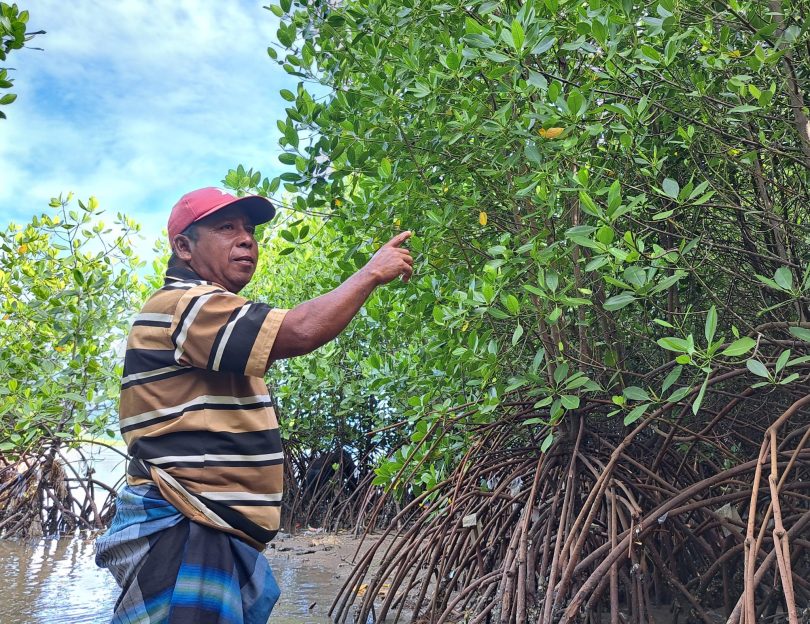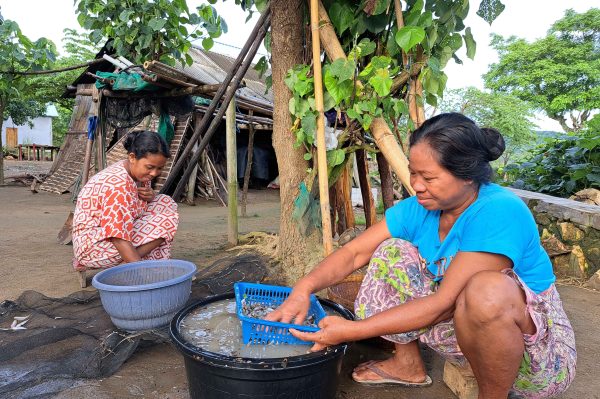The village of Cendi Manik is nestled on the southwest coast of Lombok, a stunning island in eastern Indonesia, situated just a few miles west of its more famous neighbour, Bali. Positioned in Selamat Bay near the Lombok-Bali ferry port, this village is highly susceptible to disasters owing to its proximity to the sea and an estuary.
Historically, the village’s mangroves served as a natural buffer for it. However, widespread deforestation in pursuit of firewood and building materials led to a significant reduction in mangrove vegetation. The mangrove area, once spanning 15 hectares, dwindled to around 10 hectares, significantly intensifying the adverse effects of the tidal waves and strong winds. It also contributed to a decline in breeding locations for crabs and fish, resulting in a sharp reduction in their populations. Consequently, fishing and crabbing among the mangroves became financially unsustainable as the yields failed to meet basic living costs.
In 2013, the village fell victim to a powerful cyclone where tidal waves battered the village, destroying acres of fish ponds which were the primary livelihood sources for hundreds of villagers. One of the fishpond owners was Abdul Aziz, known as Aziz.
The 2013 disaster forced the fathers of 28 families, including Aziz, to leave the village to look for work. They went to Bali, Kalimantan, and Malaysia as construction and oil palm plantation workers, leaving their wives and children behind.
Living abroad was really difficult. When Aziz left to work in Malaysia, his wife Inaq Pesah was pregnant. For six years he never came home, so he missed the birth of his son Sohida Aini, and his important early, formative years. Sohida Aini only saw photos of his father on his mother’s cell phone. Missing his father and yearning for a complete family are his strongest memories of that time.
The wives left behind relied on remittances sent by their husbands, and also occasionally went out to sea themselves to look for shellfish and crabs. “My husband went abroad for six years, and during that time I waited for money to be sent once every two or three months. I also worked looking for sea life among the mangroves to meet my daily needs, but what I could sell was only enough to buy one kilogram of rice a day,” remembers Inaq Pesah.
In response to the situation. The international NGO World Neighbors (WN) and their local partner, the Development Studies Center (PSP), initiated efforts to conserve Cendi Manik’s coastal area with funding from the United States Agency for International Development. In 2015, a village disaster management group was established and trained, and 11,500 mangrove seedlings were planted over 1.5 hectares of Madak Beach.
The mangroves slowly thrived and, in 2016, the Indonesian Ministry of Maritime Affairs and Fisheries took notice, awarding the village 125,000 additional mangrove saplings. Facilitated by WN and PSP, the Cendi Manik Village Government became more involved in mangrove conservation and broader disaster resilience efforts. In 2018, for the first time, village funds were allocated for mangrove maintenance and replanting, as well as for the repair of access roads and the installation of 200-meter-long gabions at Madak Beach to further prevent seawater intrusion.
Pak Marne, Head of Cendi Manik Village, was persuaded by evidence to allocate village funds to mangrove rehabilitation.
From a participatory disaster risk assessment conducted by PSP and WN, we learned that the threat of abrasion and tidal wave disasters in the coastal areas was very high, which would result in high environmental and economic losses for the village. So, with their support, I became committed to allocating government funds to reduce the impact of disasters. — Pak Marne
These collective efforts began to bear fruit, as the mangroves eventually grew back to their previous height. And with this increase in vegetation, the fish and crab populations increased too. The improved conditions also meant that the fishponds could be repaired and used again, as they were now protected from tidal waves and sea winds.
Word of these significant improvements reached Aziz and his friends abroad, who one by one decided to return home. With the mangroves flourishing, ponds operational, and marine life revived, the migrants reunited with their families, resuming their fishing activities. Madak Beach once again bustled with residents tending to their fishponds, and looking for fish and crabs amid the lush mangroves.
Now, besides affording a boat, Aziz has reconstructed his house which was damaged in the 2013 disaster. He is now earning more than he did before and is able to support his family.
Last year [2023] I was able to enlarge my house due to the income I’m getting from fishing amongst the mangroves. I also used this money to pay for my children’s schooling and have recently bought a motorbike. — Aziz
Most importantly, Aziz and the other returnees find joy in being with their families again, a stark contrast to the challenges they faced during their long migrations abroad.
My friends and I who a few years ago worked together far from our homes, now work together to preserve the mangroves. In the four years we’ve been home, we’ve joined the village’s efforts and have planted thousands of new mangrove saplings along our coastline. — Aziz
Successful conservation efforts in West Lombok have not only mitigated environmental threats, but also improved livelihoods, helping families to reunite. The last word is given to Aziz’s wife Inaq Pesah.
Hopefully there will be no more disasters in our village. Hopefully no more children will be separated from their parents for years because of disasters. Those years were so difficult for us. But now we’re together again, and ready to face the future with renewed optimism in what we can achieve, when we work with nature to protect what’s most valuable to us. — Inaq Pesah





A great story. I trust you do not mind if I repost it.
Yes, please go ahead.